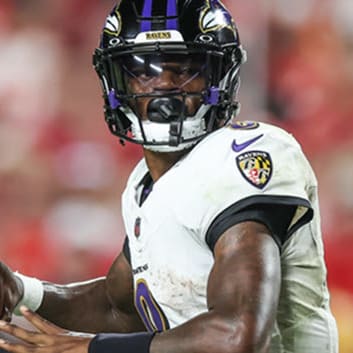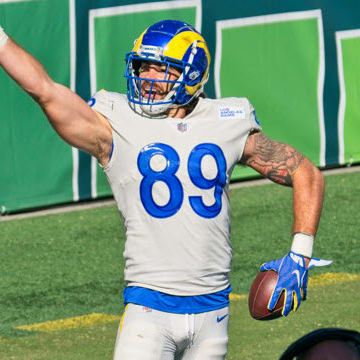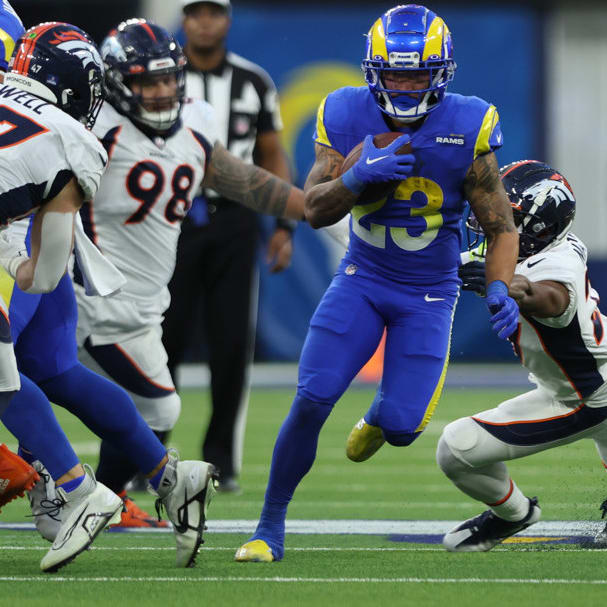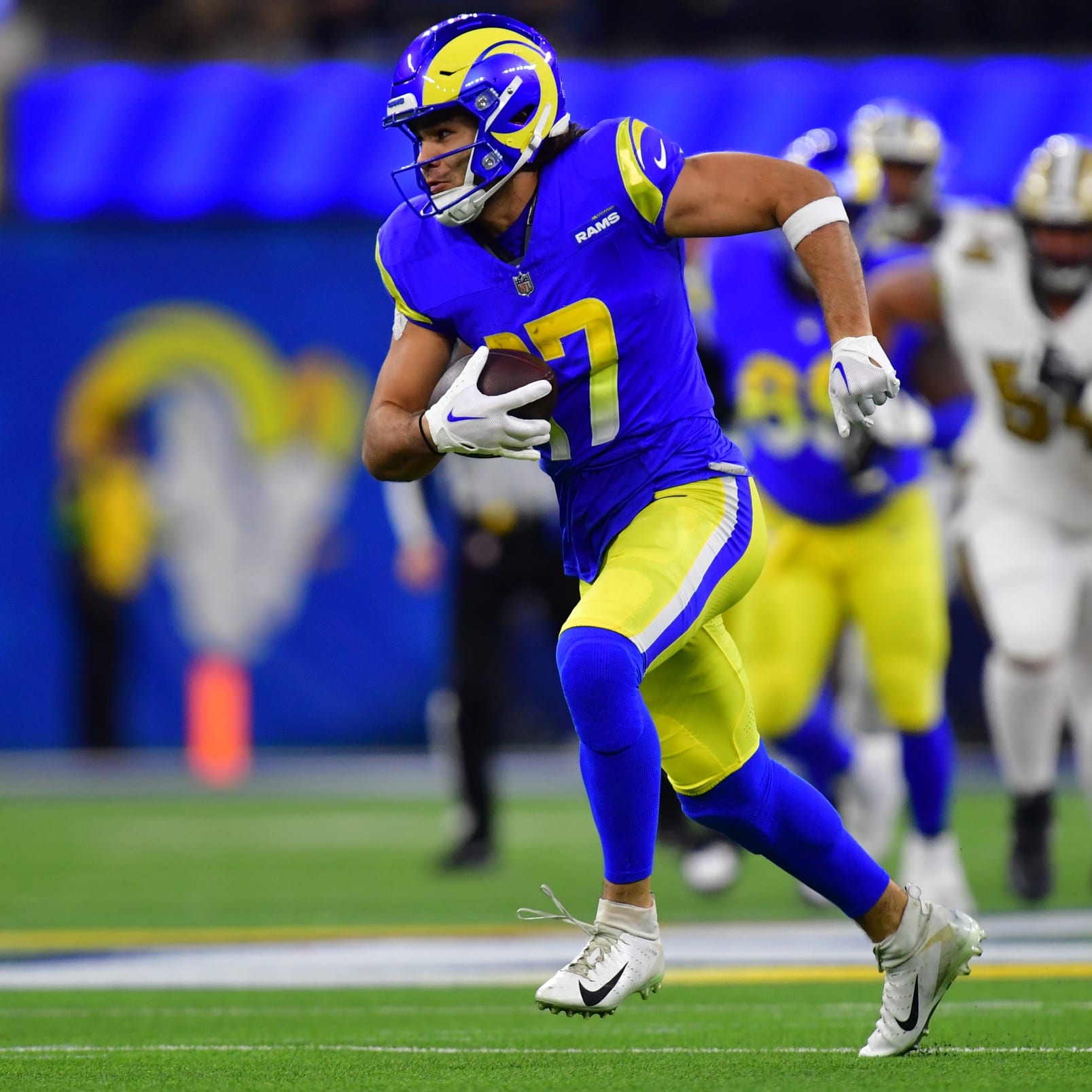This article is part of our Best Ball Strategy series.
This article will look at current ADPs in BestBall10 drafts to identify the worst values while pointing out preferable alternatives. The ADP is lifted from the last ten 12-team drafts.
Joe Burrow, QB, CIN (111.5 ADP)
Instead: Daniel Jones (148.8), Tua Tagovailoa (154.4)
Even if the Cincinnati offensive line improves and the Bengals add Ja'Marr Chase to form an elite wideout trio with Tee Higgins and Tyler Boyd, this price on Burrow probably assumes too much about his recovery from that brutal season-ending Week 11 knee injury. Week 11 was in late November, and Burrow's injury entailed not just tears to the ACL and MCL, but other unspecified additional damage to the knee structure. This is a truly disheartening injury on any recovery timeline, let alone a rushed one hoping to smuggle Burrow into Week 1.
Burrow's current price tag also seems to take standout skill as a given, but even considering how bad the offensive line was there's probably more reason to believe Burrow is around the league starting average. His 13 touchdowns to five interceptions was a slight triumph that he deserves credit for, but if you're only completing 65.3 percent of your passes then you're going to need much more than 6.7 yards per attempt, or vice versa. He had one truly strong game -- at home against Cleveland -- and the AFC North will likely remain tough defensively.
Daniel Jones might not be a good real life player but his dual-threat abilities and the addition of Kenny Golladay make him a preferable option to Burrow, especially given the price difference. Tua Tagovailoa should make a second-year jump with Will Fuller pushing the safeties back, and whatever risk he carries is offset by the discount of three-plus rounds.
Derrick Henry, RB, TEN (4.7 ADP)
Instead: Austin Ekeler (14.2), D'Andre Swift (17.4), Antonio Gibson (21.8)
It hurts me to list Henry here, as I've always been a loud Henry advocate. Most of the Sharp people in the scene declared Henry a myth and said Dion Lewis would emerge a star at Henry's expense. That will always be funny to me.
How far we've come, but perhaps we've now gone too far. Great as Henry is he will never be a notable pass catcher, and in the first five picks a running back had better catch passes. Even as a completely biased fan of Henry's I can't in good faith advise anyone to take him over Jonathan Taylor, Saquon Barkley, or Ezekiel Elliott. There's an easier case to make for Henry in standard scoring, but it just isn't there in PPR scoring like with BestBall10 leagues.
If not one of those mentioned running back alternatives, I'd probably prefer going with Davante Adams, Travis Kelce, or Tyreek Hill in the first before targeting Ekeler, Swift, or Gibson in the second. Ekeler and Swift should probably be thought of as the Alvin Kamaras of their offenses, and I think it's a mistake to assume the Saints offense will definitely be better than those of the Lions or Chargers – especially the Chargers, of course. Gibson is a different kind of player but arguably has the highest upside of any of them – the pass-catching reps weren't there in 2020, but he was better than expected as a pure runner and projects for growth in the receiving game.
Diontae Johnson, WR, PIT (44.6 ADP)
Instead: Julio Jones (45.6)
Johnson is good and shouldn't tank anyone who takes him in this range, so there's not really a need to specifically avoid him, especially if someone is pursuing a Steelers stack or is otherwise diversifying their share selection, but in general it's probably a bad idea to take him over Julio Jones, and I'd add CeeDee Lamb (44.9), DJ Moore (46.3) and Tee Higgins (48.0) to that list too.
It's understandable but nonetheless a mistake to look at Johnson's target volume from 2020 and take it for a measure of merit. The target count was the by-default result of Ben Roethlisberger's inability to throw competitive passes, so he checked down to Johnson on the outside excessively where he was in single coverage and away from safeties and linebackers, who Roethlisberger could not zip the ball past anymore for whatever reason. That is the detail that informed Johnson's target count – not a win on his part or a failure on the part of any of the other Pittsburgh receivers. It's a poor basis for assuming future growth.
The Steelers should instead consider it a priority to lessen Johnson's target volume, because his targets in 2020 were a drain on the offense, though no fault of his own. The Steelers completed 65.2 percent of their passes at 6.3 yards per attempt – a dreadful baseline – yet Johnson fell short of even that, catching 61.1 percent of his targets at 6.4 yards per target. Julio is still likely to post some of the most explosive per-usage numbers and his injury volatility doesn't matter as much in best ball.
Brandon Aiyuk, WR, SF (55.2 ADP)
Instead: Tyler Lockett (56.6), Cooper Kupp (56.8), DJ Chark (67.2)
Aiyuk is a good player but it takes an aggressive projection to rank him this high. This market reception is likely informed by his target volume, which was substantial with 96 in 728 snaps, but a quick glance at his game log reveals that he owes that target count to the injuries suffered by Deebo Samuel and George Kittle.
Of Aiyuk's 96 targets, 54 were accumulated in the five games where neither Samuel nor Kittle played. So that's 56.3 percent of his targets in only 41.7 percent of his schedule. An additional 22 targets occurred in the five games where one of Samuel or Kittle did not play. That means Aiyuk drew just 20 targets in the four games where both Samuel and Kittle were on the field. It's an egregious mistake to take him before Cooper Kupp or a full round before Chark, in my opinion. There's surprisingly little assurance Aiyuk is even more valuable than Samuel, whose ADP is far behind at 90.2
Michael Pittman, WR, IND (90.81 ADP)
Instead: Michael Gallup (106.6), DeVante Parker (107.2), Sterling Shepard (152.0), Parris Campbell (192.2)
Pittman isn't a bad player or anything, but he's going well ahead of too many players who are likely better, including teammate Parris Campbell. For Campbell to go 100 picks later than Pittman is a jarring inefficiency.
But it's especially egregious to take Pittman over some of the wide receivers immediately trailing his current ADP. Michael Gallup just played most of his 2020 season with Andy Dalton and Ben DiNucci, making his 59 receptions for 843 yards and five touchdowns a slight miracle. DeVante Parker played through injury and missed two games while dealing with declining quarterback play and still safely produced more yardage than his snap count, leaving him with a 900-yard, five-touchdown pace over 16 games while dealing with conditions that will likely prove worse than his 2021 setting. Sterling Shepard played with Colt McCoy and an injured Daniel Jones and still produced 26 more receptions and 153 more receiving yards in 12 games than Pittman did in 13.
Robert Tonyan, TE, GB (90.0 ADP)
Instead: Irv Smith (120.0), Tyler Higbee (120.7), Jonnu Smith (125.0)
Tonyan was incredibly efficient in 2020, so it's understandable that someone might look at his box score and become optimistic for his growth potential going forward. Unfortunately, there isn't much indication that he can get the target volume increase it would take to create that growth, and in the meantime his implausible efficiency is an obvious candidate for per-target regression, and probably drastically so. After catching 89.7 percent of his targets at 9.9 yards per target with 11 touchdowns on 52 receptions, it is inconceivable that Tonyan's per-usage output stay stable in 2021, let alone improve. Things can only get worse in that respect and they almost certainly will. So what about the snap count? If the snap count goes up enough it could offset the likely decline in Tonyan's efficiency.
Unfortunately for Tonyan's investors, it's not obvious how his snap count can improve much from his 638 snaps in 2020. The Packers love Marcedes Lewis, whose role as blocking specialist is not up for negotiation. Lewis logged 31.25 snaps per game in 2019 and 28.1 per game in 2020. After getting re-signed to a two-year, $8 million deal this offseason it's unlikely that Lewis' 2021 workload goes lower than 25 snaps per game. None of this is to account for 2019 third-round pick Jace Sternberger or 2020 third-round pick Josiah Deguara, the latter of which missed nearly all of last year with a shin injury and then a torn ACL in Week 4.
Logan Thomas, TE, WAS (100.38 ADP)
Instead: See Tonyan list
Thomas was a nice story in 2020, a likable underdog who withstood a journeyman circuit before emerging as an unlikely fantasy star, the conclusion of a conversion from quarterback four years earlier. The problem is his season mostly stood out because it was otherwise such a down year at tight end, and that 2020 box score was still probably the best he's capable of. Thomas was decent in PPR last year, but he's largely the beneficiary of lowered expectations. Not only is the tight end position likely to bounce back in 2021, but Thomas' target volume is likely to decline, too.
First, Thomas' 2020 numbers were boosted by an improbably high snap count. He logged 1,009 snaps, which led all NFL tight ends. Darren Waller was second with 992. Only nine tight ends in the entire league played more than 785 snaps. Thomas' 109 targets are both less impressive in light of this and less safe. His snap count will likely either drop or the snap count of the field will likely rise, and Thomas' per-snap target rate is likely to fall within that broader shift.
The reason we should expect Thomas' target rate to drop is because he wasn't actually effective in 2020 and Washington is no longer dependent on him for targets. It would be one thing if Thomas were a Waller-like force in an otherwise poor offense, but that isn't what happened. The Washington passing game completed 67.9 percent of its targets at 6.6 yards per target. Thomas caught 66.1 percent of his targets at 6.2 yards per target. This means Thomas was below the team baseline, and his usage was actually a drain on the offense rather than a benefit. That's not to say Thomas was bad, just that he couldn't hold up under the excessive workload Washington gave him. Thomas was the biggest fish in a small pond. I've seen some suggest the signing of Ryan Fitzpatrick helps Thomas, but that seems wrong to me. Fitzpatrick is more likely to throw downfield to Terry McLaurin and Curtis Samuel than Alex Smith was.
Saints Defense (206.7 ADP)
Instead: Chargers (212.7), Cardinals (223.8)
The Saints defense is fine, but it might not be worth the price. Sack and interception opportunities will decrease if the offense declines under Jameis Winston or/and Taysom Hill, because teams wouldn't need to throw as much as they did against the Drew Brees teams to keep pace on the score board. If this occurs the development would be compounded by a decrease in the talent of the Saints defense, which is probably safe to assume given that the defensive line lost standout defensive tackle Sheldon Rankins and 13.5-sack defensive end Trey Hendrickson in free agency. They also had to trade run-stopping tackle Malcom Brown in a cost-cutting move, and starting corner Janoris Jenkins is now in Tennessee.
At a lower cost you might consider instead the Chargers or/and Cardinals. Brandon Staley turned the Rams defense from decent to great last year, and now he's running the Chargers defense as head coach. The Justin Herbert offense should secure plenty of leads, which could tee up a career year for Joey Bosa. If Derwin James could for once have some injury luck then there are two first-team All Pros right there.
I wish the Cardinals would fire Kliff Kingsbury but an improved Cardinals defense is a big reason why I don't think that will happen. Kliff shouldn't get any credit for the Cardinals defense, but their pass rush is going to help them win games. Chandler Jones is a 20-sack threat, Isaiah Simmons is an imminent All Pro, Dennis Gardeck had seven sacks in 93 snaps last year, Markus Golden has twice posted double-digit sacks, and J.J. Watt's arrival gives them a huge boost on the interior. With Kyler Murray constantly bailing out Kingsbury on offense, that pass-rushing talent should get plenty of opportunity to show off.












